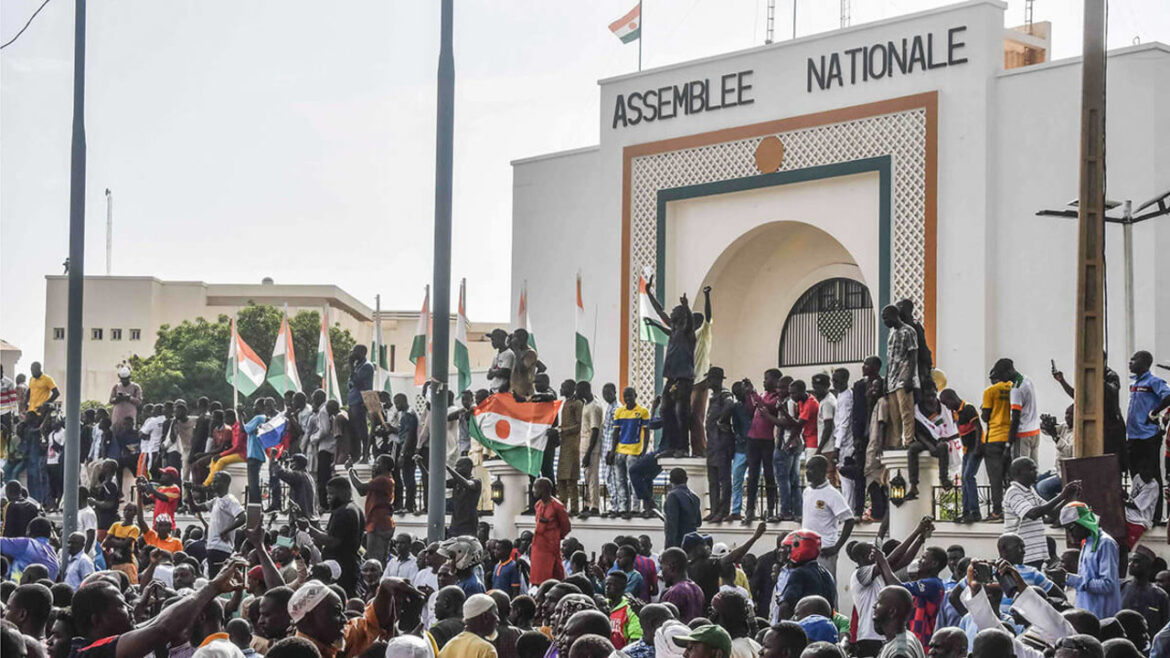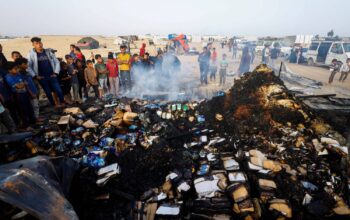In Niger, the Economic Community of West African States (ECOWAS) has issued an ultimatum to Niger’s coup leaders and imposed harsh financial sanctions against the country, where anti-French demonstrations have erupted
The security situation in Niger is rapidly accelerating. Last Wednesday, President Mohamed Bazoum was overthrown in a military coup, which the entire international community was quick to condemn. Today, the country faces sanctions from West African countries and tensions with France, of which Bazoum’s government was a close ally.
ECOWAS sanctions Niger, gives it an ultimatum
On Sunday, ECOWAS imposed sanctions on Niger and warned the coup leaders that they had seven days to reinstate the ousted Mohamed Bazoum. ECOWAS and the West African Economic and Monetary Union (WAEMU) declared that borders with Niger would be closed, commercial flights banned, financial transactions paralysed, national assets frozen and aid withdrawn. In addition, military personnel involved in the coup would be banned from travelling and their personal assets would be frozen.
Niger’s Prime Minister Ouhoumoudou Mahamadou, who was abroad at the time of the coup and has been unable to return to Niger, told RFI that the sanctions will be disastrous for the country. “Niger is a continental country, a landlocked country. So when we say that there is an embargo, that the land and air borders are closed, it is extremely difficult for the people. And when that is accompanied by financial sanctions, in a country that already has a fragile financial situation, you can understand the disaster that this situation could cause,” the Prime Minister said.
US Secretary of State Antony Blinken welcomed the ECOWAS action and said in a statement: “We join ECOWAS and regional leaders in calling for the immediate release of President Mohamed Bazoum and his family, and for the restoration of all state functions to the legitimate and democratically elected government”.
Niger is the fourth Sahel country to have suffered a military coup in recent years, after Mali, Burkina Faso and Guinea. ECOWAS has imposed similar sanctions on these countries, but each has been affected differently. While it is true that sanctions have led to debt defaults, especially in Mali, these measures have mostly hurt the civilian population rather than the military rulers.
In Niger, the military coup has been condemned by neighbouring countries and a large majority of the international community, including the United States, the United Nations, the African Union, the European Union and France, with whom tensions have been rising since the weekend.
Tensions between the junta and France rise
Thousands of people demonstrated outside the French embassy in Niamey, Niger’s capital, on Sunday in support of the military coup. According to France24, some protesters insisted on entering the building, while others tore off the plaque reading “French Embassy in Niger”, before trampling it into the asphalt and replacing it with Russian and Niger flags.
The lack of security resulting from these demonstrations forced the French police stationed at the embassy to fire tear gas grenades to disperse the crowd. The following day, the Nigerian military junta accused France of wanting to “intervene militarily” to restore President Mohamed Bazoum to office. “In line with its policy of seeking ways and means to intervene militarily in Niger, France, with the complicity of some Nigeriens, held a meeting at the headquarters of the Niger National Guard to obtain the necessary political and military authorisations,” the statement said.

French President Emmanuel Macron was quick to respond to the threat, stating that “anyone who attacks French citizens, the army, diplomats and French bases will see France retaliate immediately and intractably”. Today, the French government estimates that there are between 500 and 600 French citizens in Niger. All of them have been contacted and measures have been taken to ensure their protection. The Elysée also wished to recall “the friendship between the peoples of Niger and France and France’s special role in the fight against terrorism and for the economic and social development of Niger”.
Indeed, Niger has been a key ally in Western campaigns against al-Qaeda and Islamic State-linked insurgents in the Sahel. The US, France, Italy and Germany have troops there engaged in military training and missions to fight Islamist insurgents.

According to Jeune Afrique, the junta’s accusation comes at a time of growing international pressure on the army. The ultimatum set by ECOWAS does not exclude “recourse to force” if the demanded return to order is not respected. Welcomed by France, this decision has increased tensions between Paris and the junta, which recently suspended gold and uranium deliveries to France.

Niger, a new door for Wagner?
While ECOWAS is grateful to those nations that have aligned themselves with its position, it condemns the support given to the military junta by foreign governments and foreign private military companies. This is particularly true of Wagner, whose chief Evgueni Prigojine welcomed the coup as good news and offered the services of his fighters to restore order.
For several years now, Africa has been the Wagner group’s favoured terrain. In particular, it has supported the vast majority of coup leaders in Mali, Burkina Faso, Guinea and now Niger, accentuating anti-French propaganda. Thousands of French soldiers have been forced to withdraw from neighbouring Mali and Burkina Faso in the wake of the coups, opening the door to greater Russian influence in the region.

Last week, Vladimir Putin paid tribute to the coup leaders at the Russia-Africa summit on 28-29 July, although neither military issues nor the Wagner group were discussed.
Source: Atalayar




